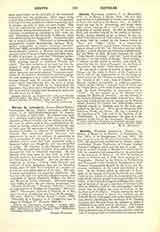

Kervyn de Lettenhove, JOSEPH-MARIE-BRUNO-CONSTANTIN, Baron, Belgian statesman and historian, b. at Saint-Michel-lez-Bruges, August 17, 1817; d. there, April 3, 1891. He entered very early on a political career, and in 1861 was sent to the Chamber of Representatives by the district of Eecloo. He took an active part in most parliamentary debates on foreign affairs and public instruction, and in 1870 upon the accession of his party, the Constitutional Catholics, he received the portfolio of the Interior. His ministerial career, however, was short-lived; he made the mistake of appointing to the governorship of Limburg P. de Decker, a former minister whose name had been connected with a financial failure (see Belgium), and was compelled to resign. He remained in the Chamber of Representatives, but gradually withdrew from politics and devoted his time to historical researches. He had already won some fame in that field: in 1856 the French Academy had crowned his work “Etudes sur les Chroniques de Froissart”. Kervyn travelled extensively in Europe, visiting most libraries and archives of note, gathering data for his historical works, some of which have modified on a number of points the prevailing opinion of his time. His style is grave and polished but somewhat bombastic. He has been charged, but without sufficient reason, with unfairness to Queen Elizabeth, William the Silent, and Marnix de Sainte Aldegonde. His most important works, besides the one already mentioned, are: “Histoire de Flandre” (Brussels, 1847-50); “Lettres et negotiations de Philippe de Commines” (Brussels, 1867); “Chroniques relatives a l’histoire de la Belgique sous la domination des dues de Bourgogne” (Brussels, 1870-7); “Marie Stuart” (Paris, 1889); “Relations de la Belgique et de l’Angleterre sous le regne de Philippe II” (Brussels, 1882-91).
PIERRE MARIQUE

